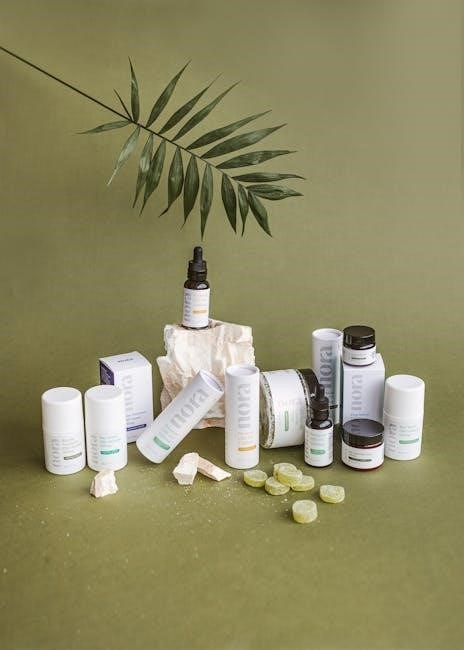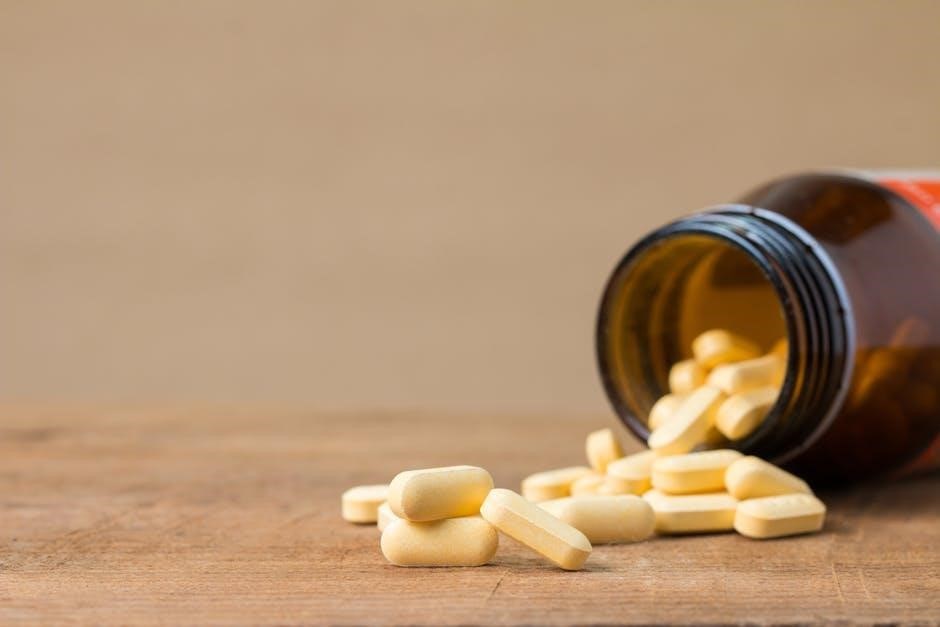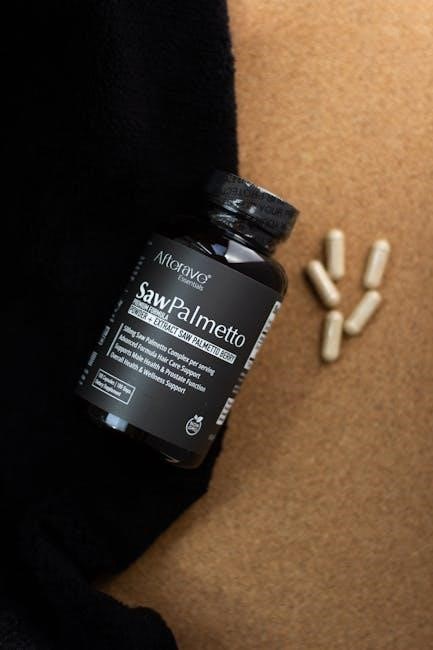Herbal tablets offer a convenient, modern way to harness the benefits of traditional herbs․ They provide improved digestion, stress relief, and detoxification in an easy-to-consume form, gaining popularity worldwide for their natural health benefits․
What Are Herbal Tablets?
Herbal tablets are dietary supplements made from concentrated plant extracts, offering a natural way to support health․ They are created by processing and compressing raw herbs into a convenient form․ Unlike raw herbs, tablets provide consistent dosing and enhanced bioavailability, making nutrients easier to absorb․ They are free from the taste and preparation challenges of raw herbs, appealing to those seeking natural health solutions․ Herbal tablets are widely used for digestion, immunity, and stress relief, making them a popular choice for holistic wellness․ Their portability and shelf stability add to their convenience for modern lifestyles․
Popularity and Usage of Herbal Tablets
Herbal tablets have gained significant popularity due to their convenience and natural health benefits․ They are widely used for digestion, immunity, and stress relief, appealing to those seeking holistic wellness․ Their portability and consistent dosing make them a preferred choice over raw herbs․ With increasing awareness of natural health solutions, herbal tablets are becoming a staple in many households․ They are particularly favored for their ease of use and ability to address multiple health concerns in one form․ This shift toward natural remedies has fueled their global acceptance and usage across diverse demographics․
Key Benefits of Herbal Tablets
Herbal tablets offer numerous benefits, including improved digestion, enhanced immunity, and stress relief․ They provide a convenient way to consume herbs without the hassle of preparation․ Their bioavailability ensures maximum absorption of active compounds, making them more effective than raw herbs․ Additionally, herbal tablets are often standardized, guaranteeing consistent potency․ They support overall well-being by addressing specific health concerns, such as detoxification and energy enhancement․ Their portability and ease of use make them a popular choice for those seeking natural health solutions․ This makes herbal tablets a versatile and efficient option for modern health needs․
Health Benefits of Herbal Tablets

Herbal tablets promote overall well-being by enhancing digestion, immunity, and mental clarity․ They support detoxification, energy, and vitality, offering natural solutions for various health concerns effectively and safely․
Improved Digestion and Gut Health
Herbal tablets containing ginger, turmeric, and other natural ingredients can significantly enhance digestive health․ They reduce bloating, alleviate indigestion, and support gut balance․ These tablets often target the root causes of digestive issues, promoting a healthy gut microbiome․ By addressing inflammation and improving nutrient absorption, they contribute to overall well-being․ Regular use can also prevent common digestive disorders, ensuring a smoother digestive process․ The bioactive compounds in these herbs work synergistically to restore gut health naturally, making herbal tablets a popular choice for those seeking effective, non-invasive digestive support․
Enhanced Immunity and Antioxidant Properties
Herbal tablets rich in Echinacea, Boswellia, and other immune-boosting herbs enhance the body’s natural defense system․ These tablets contain antioxidants that combat free radicals, reducing oxidative stress and inflammation․ By strengthening immune function, they help prevent infections and promote overall well-being․ The bioactive compounds in these herbs also support lymphatic health, ensuring efficient detoxification․ Regular consumption of such tablets can lead to a stronger immune response, reducing the severity of illnesses․ Their antioxidant properties further protect cells from damage, contributing to long-term health and vitality․ This makes herbal tablets a valuable supplement for immune support and oxidative balance․
Stress Relief and Mental Well-being
Herbal tablets containing Ashwagandha, chamomile, and lavender are renowned for their calming effects, reducing stress and anxiety․ These natural ingredients promote relaxation, improve mood, and enhance mental clarity․ By addressing cortisol levels, they help alleviate chronic stress and support emotional balance․ Additionally, herbs like passionflower and valerian root in tablets can improve sleep quality, further benefiting mental health․ Regular use of these tablets fosters a sense of calm and well-being, making them a popular choice for managing modern lifestyle pressures without the side effects of synthetic medications;
Detoxification and Liver Support
Herbal tablets rich in milk thistle, dandelion root, and turmeric support liver health by promoting detoxification․ These ingredients enhance the liver’s natural ability to remove toxins, improving metabolic processes․ They also protect liver cells from damage, aiding in overall detoxification․ Regular use of these tablets can help maintain healthy liver function and support the body’s natural cleansing mechanisms․ By combining traditional herbs, they offer a natural and safe way to promote detoxification and liver well-being, making them a popular choice for those seeking holistic health solutions․
Energy Boost and Vitality
Herbal tablets containing Ashwagandha, Ginseng, and Maca root are known to enhance energy levels and vitality․ These natural ingredients work synergistically to combat fatigue, improve stamina, and support physical performance․ Ashwagandha, an adaptogenic herb, helps reduce stress-induced energy drain, while Ginseng boosts mental clarity and vitality․ Maca root, rich in minerals, promotes sustained energy and hormonal balance․ By addressing both physical and mental exhaustion, these tablets offer a holistic approach to restoring vitality, making them a popular choice for individuals seeking natural energy solutions without the side effects of synthetic stimulants․

How Herbal Tablets Work

Herbal tablets deliver concentrated plant compounds, enhancing bioavailability for optimal absorption․ They offer targeted health benefits, combining traditional herbs in convenient, precise doses for improved wellness and efficacy․
Targeted Health Effects of Herbal Compounds
Herbal compounds in tablets are formulated to address specific health needs․ Turmeric reduces inflammation, ginger aids digestion, and ashwagandha combats stress․ These targeted effects ensure users receive maximum benefits for their well-being, making herbal tablets a popular choice for natural health solutions․ By focusing on particular health concerns, these compounds enhance overall wellness without the drawbacks of raw herbs, offering a modern approach to traditional medicine․
Advantages Over Raw Herbs
Herbal tablets offer significant advantages over raw herbs, including convenience, consistency, and enhanced bioavailability․ Unlike raw herbs, which require preparation and may vary in potency, tablets provide standardized doses․ They eliminate the need for taste adjustments and are easier to consume․ Additionally, tablets often combine multiple herbs for synergistic effects, making them more effective than single raw herbs․ This modern approach ensures users receive reliable benefits without the hassle of traditional herbal preparations, making tablets a preferred choice for health-conscious individuals seeking natural solutions․
Role of Bioavailability in Herbal Supplements
Bioavailability plays a crucial role in herbal supplements by determining how effectively the body absorbs active compounds․ Higher bioavailability ensures maximum therapeutic benefits, as more nutrients are utilized․ Factors like digestion, absorption rates, and formulation significantly impact bioavailability․ Herbal tablets often enhance bioavailability through standardized extraction methods, ensuring consistent levels of active compounds․ This optimization allows users to experience the full potential of herbal ingredients, making supplements more effective and reliable․ Improved bioavailability is a key reason herbal tablets are preferred over raw herbs, as they deliver targeted health benefits more efficiently․
Safety and Side Effects
Herbal tablets are generally safe but may cause side effects like allergies or interactions․ Precautions are essential for specific groups, ensuring safe usage․
General Safety of Herbal Tablets
Herbal tablets are generally considered safe when used appropriately, with minimal side effects․ They are well-tolerated, making them a popular choice for natural health support․ However, limited scientific evidence exists for some herbs, and quality can vary․ Third-party testing ensures purity and potency, reducing risks․ While rare, allergic reactions or interactions with medications may occur․ Users should consult healthcare professionals, especially if pregnant, breastfeeding, or on chronic medications․ Proper dosage and sourcing are crucial for safe usage, balancing potential benefits with precautions to avoid adverse effects․
Possible Side Effects and Allergies
While herbal tablets are generally safe, they can cause mild side effects like gastrointestinal discomfort or allergic reactions in some individuals․ Certain herbs may trigger allergies, especially in sensitive persons; For example, turmeric or ginger can cause stomach upset in high doses․ Additionally, interactions with medications or exacerbation of underlying conditions are possible․ Rarely, severe allergic reactions may occur, such as rash or breathing difficulties․ Users should monitor their body’s response and consult healthcare professionals if adverse effects persist․ Proper dosage and awareness of individual sensitivities are key to minimizing risks associated with herbal supplements․
Precautions for Specific Groups
Herbal tablets may require special precautions for certain groups, such as pregnant women, children, and individuals with chronic illnesses․ Pregnant women should avoid herbs like turmeric and ginger in high doses, as they may stimulate the uterus․ Children should only use herbal tablets under medical supervision due to potential sensitivity․ People with liver or kidney conditions must be cautious, as some herbs can strain these organs․ Additionally, individuals on blood thinners or diabetes medications should consult their doctor, as herbal compounds may interact with these drugs․ Always prioritize professional advice for safe and effective use․

Regulations and Quality Control
Herbal tablets are regulated by the FDA as dietary supplements, ensuring safety and purity․ Third-party testing and global standards further guarantee product quality and consumer trust․
FDA Oversight of Herbal Supplements
The FDA regulates herbal supplements under the Dietary Supplement Health and Education Act (DSHEA), ensuring they are safe and properly labeled․ Manufacturers must adhere to Good Manufacturing Practices (GMPs) to maintain product quality and purity․ The FDA monitors for adverse effects and can recall products if they pose health risks․ While herbal tablets are not subject to the same rigorous approval process as prescription drugs, the FDA’s oversight helps protect consumers by enforcing standards and addressing safety concerns․
Importance of Third-Party Testing
Third-party testing is a critical step in ensuring the quality, safety, and purity of herbal tablets․ Independent labs verify the accuracy of label claims, detect contaminants, and confirm the presence of active ingredients․ This process builds consumer trust and ensures products meet regulatory standards․ It also helps identify any potential adulterants or heavy metals, safeguarding user health․ By verifying potency and consistency, third-party testing enhances the credibility of herbal supplements, making them more reliable for consumers seeking natural health solutions․
Global Standards for Herbal Products
Global standards for herbal products ensure consistency, safety, and quality across international markets․ Regulatory bodies like the WHO and EMA establish guidelines for manufacturing, labeling, and safety․ These standards require rigorous testing, purity verification, and adherence to Good Manufacturing Practices (GMPs)․ They also address contamination risks and ensure herbal products meet specific potency levels․ Compliance with these standards helps build consumer trust and facilitates global trade․ By aligning with international norms, manufacturers ensure their herbal tablets are reliable and safe for diverse populations, fostering confidence in natural health solutions worldwide․

Popular Herbs Used in Tablets
Herbal tablets often feature turmeric, ginger, ashwagandha, echinacea, and boswellia․ These herbs are renowned for their anti-inflammatory, digestive, stress-relieving, immune-boosting, and joint-supporting properties, making them highly sought after for natural health solutions․
Turmeric and Its Anti-Inflammatory Properties
Turmeric, a vibrant yellow-orange spice, is renowned for its potent anti-inflammatory properties, primarily due to curcumin․ This active compound has been extensively studied for its ability to reduce inflammation and alleviate symptoms associated with conditions like arthritis․ Turmeric’s anti-inflammatory effects are also linked to improved heart health and enhanced cognitive function․ In herbal tablets, turmeric is often combined with black pepper to boost bioavailability, ensuring maximum absorption of curcumin․ Its natural, non-invasive approach makes it a popular choice for those seeking holistic health solutions without harsh side effects․
Ginger for Digestive Health
Ginger, a natural remedy, is widely recognized for its digestive benefits․ It aids in relieving bloating, soothing upset stomachs, and promoting overall gut wellness․ Rich in antioxidants, ginger helps reduce inflammation in the digestive tract, offering relief from nausea and indigestion․ Its active compounds, such as gingerol, contribute to its therapeutic properties․ In herbal tablets, ginger is often combined with other digestive herbs to enhance efficacy․ This convenient form allows users to harness ginger’s benefits without the need for fresh preparation, making it a popular choice for maintaining healthy digestion and addressing common gastrointestinal discomforts effectively․
Ashwagandha for Stress Relief
Ashwagandha, an adaptogenic herb, is renowned for its ability to combat stress and promote mental well-being․ It helps reduce cortisol levels, alleviating anxiety and fatigue․ In herbal tablets, Ashwagandha is often combined with other stress-relieving compounds to enhance its effects․ This convenient form allows users to benefit from its calming properties without the hassle of traditional preparation․ Ashwagandha’s adaptogenic qualities make it a popular choice for balancing stress hormones and improving overall mental clarity, supported by both traditional use and modern research․

Echinacea for Immune Support
Echinacea is a widely recognized herb for immune system support, often used to prevent and alleviate colds and flu․ Its anti-inflammatory and antioxidant properties help reduce illness severity and duration․ In herbal tablets, Echinacea is frequently combined with other immune-boosting ingredients to enhance its effects․ This convenient form ensures consistent dosing and optimal absorption․ Studies suggest Echinacea may reduce the risk of respiratory infections and support overall immune function, making it a popular choice for natural health enthusiasts seeking to strengthen their defenses during peak sickness seasons․
Boswellia and Joint Health
Boswellia, derived from the Boswellia serrata tree, is renowned for its anti-inflammatory properties, making it a natural remedy for joint health․ It has been used in traditional Ayurvedic medicine to reduce inflammation and improve mobility in conditions like arthritis․ The active compounds in Boswellia inhibit inflammatory enzymes, providing relief from joint pain and swelling․ Herbal tablets containing Boswellia offer a convenient way to support joint health without the need for raw herb preparation․ Regular use may enhance joint flexibility and reduce stiffness, promoting an active lifestyle․ Always consult a healthcare professional before starting any new supplement regimen․

Effectiveness of Herbal Tablets
Herbal tablets combine traditional herbs with modern science, offering targeted health benefits․ Their effectiveness is supported by both scientific research and centuries of traditional use, enhancing overall well-being․
Scientific Evidence and Research
Scientific studies increasingly validate the effectiveness of herbal tablets․ Research highlights their potential in improving digestion, immunity, and mental health․ While some benefits are supported by robust clinical trials, others rely on traditional use․ For instance, turmeric’s anti-inflammatory properties and ginger’s digestive benefits are well-documented․ However, more research is needed to fully understand the efficacy of certain herbal compounds․ Despite this, herbal tablets remain a popular choice for those seeking natural health solutions backed by both tradition and emerging science․
Traditional Use vs․ Modern Applications
Herbal tablets bridge traditional herbal medicine with modern convenience․ Historically, herbs like turmeric and ginger were consumed raw or in teas․ Today, tablets offer precise dosing and enhanced bioavailability․ Modern processing preserves potency while ensuring safety and consistency․ This evolution makes herbal remedies more accessible, maintaining their natural essence while catering to contemporary lifestyles․ The shift from raw herbs to tablets reflects a blend of ancient wisdom and innovative delivery, appealing to both traditionalists and those seeking convenient health solutions․
How to Choose the Right Herbal Tablets
Selecting the right herbal tablets involves verifying quality, purity, and manufacturer reputation․ Ensure third-party testing and consult healthcare professionals for personalized advice to meet your health needs effectively․
Quality and Purity of Ingredients
Ensuring the quality and purity of ingredients is crucial when selecting herbal tablets․ Look for products that undergo rigorous third-party testing to confirm the absence of contaminants and adherence to potency standards․ Reputable manufacturers often disclose their sourcing practices, ensuring herbs are sustainably harvested and free from harmful additives․ High-quality herbal tablets typically feature standardized extracts, guaranteeing consistent levels of active compounds․ Always check for certifications like USDA Organic or NSF International to verify product integrity and safety․
Reputation of the Manufacturer
The reputation of the manufacturer plays a vital role in ensuring the safety and efficacy of herbal tablets․ A reputable company will have a proven track record of producing high-quality products, adhering to strict quality control measures, and complying with regulatory standards․ Look for manufacturers with years of experience and positive customer feedback․ Transparency in sourcing, production, and testing processes is a hallmark of trustworthy brands․ Additionally, third-party certifications and independent testing can further validate a manufacturer’s commitment to delivering pure and effective herbal supplements․
Consulting Healthcare Professionals

Consulting healthcare professionals is essential before starting herbal tablets, especially for individuals with pre-existing conditions or those taking medications․ They can provide personalized advice, ensuring safe and effective use․ Herbal tablets, while natural, may interact with prescription drugs or worsen health conditions․ A healthcare provider can help determine appropriate dosages and monitor potential side effects․ This step is crucial for vulnerable groups, such as pregnant women or those with chronic illnesses․ By seeking professional guidance, users can maximize benefits and minimize risks, ensuring herbal supplements align with their overall health goals and medical history․
Herbal tablets offer natural health solutions with proven benefits, but effectiveness varies․ Informed decisions, quality checks, and professional advice are key to maximizing their potential for overall well-being and safety․
Final Thoughts on Herbal Tablets

Herbal tablets are a popular choice for natural health support, offering benefits like improved digestion, immunity, and stress relief․ While they are generally well-tolerated, their effectiveness can vary․ Users should prioritize quality, purity, and scientific backing when selecting products․ Consulting healthcare professionals ensures safe and appropriate use, especially for those with health conditions or on medications․ By making informed decisions, individuals can harness the potential of herbal tablets to enhance their well-being while minimizing risks․
Future of Herbal Medicine
The future of herbal medicine looks promising, with growing interest in natural health solutions․ Advances in research and technology are expected to enhance the efficacy and safety of herbal tablets․ As scientific understanding of herbal compounds deepens, their integration into mainstream healthcare may increase․ Global regulations and quality standards will play a crucial role in ensuring reliability․ Sustainability and ethical sourcing of herbs will also become key focuses․ With ongoing innovation, herbal medicine could offer even more personalized and effective health options, bridging traditional practices with modern wellness needs․
